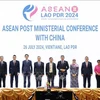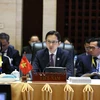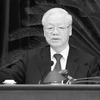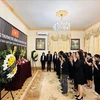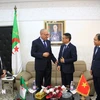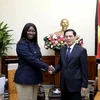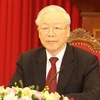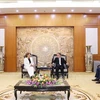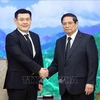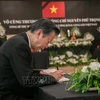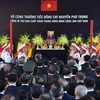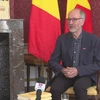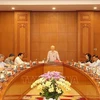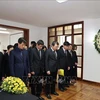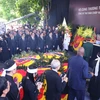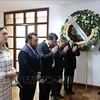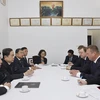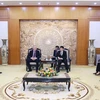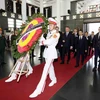The Vietnamese Party and State’s religious and belief policies have vanquished schemes to abuse religions to conduct a “peace evolution”. This is the title of an article by Major General Ass. Prof. Tran Minh Thu, Editor-in-Chief of the People’s Public Security Magazine, released on the occasion of Human Rights Day.
Vietnam is home to many religions and beliefs whose followers are working people with a strong patriotic spirit. The Communist Party of Vietnam had, in its first political platform, defined that followers of religions are part of Vietnam’s revolutionary forces, the article read.
Since then, the Party and State have designed a number of policies to strengthen the unity of religions in the great national unity bloc to successfully implement national liberation and build socialism in the country.
The religious and belief freedom of people has always been respected and observed by the State as one of the fundamental rights of citizens, it said.
However, hostile forces have never ceased their efforts to allege that Vietnam has no religious freedom and slander the State to violate democracy and human rights. They have tried to harm the country’s great unity and drive a wedge between the Party, State and religious followers, inciting them to act against the Government and damaging political and social stability with a hope to interfere in Vietnam’s home affairs, the article said.
The hostiles believe that religious activities are outside of State management, which is totally false in terms of both theory and reality, according to the article.
Firstly, religious organisations are social ones, thus in any country, their foundation and operation must be under the management of the State. Unless they are recognised by the State, the organisations have no legal status. And, once granted legal status, the organisations must abide by regulations and law and bear all the responsibilities of their activities.
Hostile and reactionary forces in and outside the country have always tried to distort the religious situation in Vietnam and slander the Government to suppress religions, hinder the construction of places of worship and make the operations of religious dignitaries difficult, the article said.
Religious activities do not only satisfy the spiritual needs of followers, monks and dignitaries but are also a social-related issue.
For instance, building places of worship is not only understood as an activity of upgrading and developing religious facilities, but also associated with State regulations on land use, planning and construction. Similarly, the printing of liturgical books and the production of religious products also relate to cultural and publication principles.
Meanwhile, activities that see coordination with foreign religious individuals and organisations must pertain to policies and law on external relations and entrance and exit. The training of religious activities is carried out in compliance with the Education Law, it cited.
In short, all activities of State agencies, political and social organisations and all citizens involved in social life must abide by law. Religions and their activities in any nation cannot stand beyond that country’s law.
International law and the law of many countries define religious freedom rights as a basic right of citizens that must be regulated by the state.
Throughout Vietnam’s history, the State has issued numerous legal documents to adjust social relations with religions and religious activities.
On November 8, 2012, the Government promulgated Decree No. 92.2012.ND-CP prescribing specific measures to enforce the Ordinance on Religions and Beliefs. The documents directly regulate the basic contents of religions and belief practices in the country.
State management in the field has been increasingly improved, making significant contributions to the protection of religious and belief freedom for the people as well as the solidarity among followers in the national unity bloc as a whole, cracking down on schemes and activities to abuse religions and beliefs to harm national security, the article said.
Religious and belief freedom policies outlined by the Party and State have basically met the aspirations of the people, consolidating trust and motivating and encouraging religious followers to deeply engage with the whole country in national construction and defence, it said.
The article made clear that after nearly three decades of realising the “doi moi” (renewal) cause launched and led by the Party, Vietnam has gained a number of remarkable achievements in various fields, including religion.
Since 2006 when the US Department of State brought Vietnam out of the “watch list” of Countries of Particular Concern (CPC), Vietnam has recorded rapid progress in the domain.
Religious freedom policies have helped 37 religious organisations get recognised from just three in the past -- the Evangelical Church of Vietnam (North), the Vietnam Catholic Church and the Vietnam Buddhist Sangha. Over the past years, Vietnam has also considered and recognised organisationally many religions.
In 2011 and 2012 only, 600 places of worship were upgraded and restored, while 500 new religious facilities were built. Education establishments of many religions have been opened in many localities enjoying favourable conditions created by the local governments, the article cited.
In the last eight years alone, as many as 15,000 religious dignitaries have been appointed and elected in Vietnam, of whom 17 were appointed by the Pope as bishops and auxiliary bishops. Vietnam currently has 83,000 dignitaries and 250,000 religious assistants.
Also during eight years of implementing the Ordinance on Religions and Beliefs, nearly 20,000 worship establishments were built and upgraded. Authorised agencies have also licensed hundreds of hectares of land for the construction of these places.
Notably, Ho Chi Minh City donated 7,500 square metres of land to the Evangelical Church of Vietnam (South) to build the Vietnam Master’s Theological Institute, while Hanoi granted 10 hectares to the Vietnam Buddhist Sangha to construct the Buddhism Academy. At the same time, the Central Highlands province of Dak Lak gave 11,000 square metres to the Buon Ma Thuot Bishopric, Da Nang city donated over 9,000 square metres to the Da Nang Bishopric, and the central province of Quang Tri granted an extra 15 hectares of land to the La Vang Parish, the article noted.
The State of Vietnam has also paid much attention to reporting and publication activities related to religions, meeting the operational needs of religious organisations. So far, nearly all have issued their own newspapers, magazines and bulletins.
Statistics show that since 2006, the Religion Publishing House has licensed 5,841 publications including 4,725 book titles with 14,535,464 copies, and CDs and DVDs, photos, and calendars, in various languages like English and French, and the languages of many ethnic minority groups such as Khmer, Ede, Gia Rai and Ba Na.
Over the past years, Vietnam has welcomed many foreign delegations and sent many of its own abroad to exchange religious experience, while actively taking part in regional and international forums and conferences in the field. In particular, the Vietnam-Vatican relations have seen remarkable progress, the article said.
The article also highlighted Vietnam’s success in ensuring human rights, including religious freedom, acknowledged by both religious and non-religious people as well as international public. This has helped reject all distortion and deformation in the field by organisations and individuals bearing ill will, proving that all allegations are just solitary voices with dishonest intentions to harm peace, national sovereignty, independence, freedom and the political institution of Vietnam.
Some parishioners and religious dignitaries who commit actions to abuse religious and belief freedom in order to counter the Vietnamese State have been arrested and handled in accordance with law. However, unfriendly forces have always tried to distort the situation and groundlessly accuse the Vietnamese Government of arresting people for religious-related reasons, attempting to interfere in the cases and demanding the release of the arrested people.
This action is a violation against international law and a clear interference in Vietnam’s internal affairs, the article pointed out.
Reality has confirmed that accompanying the nation and the regime in the process of national reform has become a key trend embracing all activities of believers and religious dignitaries, it stressed.
There are still some religious dignitaries and followers nurturing their personal discontent or anti-regime ideas, who commit illegal actions such as directing and inciting believers to cause social disturbance, resisting on-duty officials, hindering the implementation of State policies and laws and complicating security and order in some localities.
Authorities have spoken with these elements and given them advice to get rid of law-breaking actions. However, the stubborn people still continued their wrong-doings, forcing authorised agencies to commence legal proceedings against them in accordance with the law, the article read.
In fact, no one in Vietnam has been arrested for religious reasons. All religious dignitaries and followers are also Vietnamese citizens, thus they are obliged to abide by the law of Vietnam.
All citizens violating the law must be strictly punished. If they break the law, the dignitaries, monks and followers will be handled as citizens. In Vietnam, all citizens, regardless of their religions and beliefs, ethnic group or social position, are equal before the law.
The fact that some countries design their own law to judge the religious situation in Vietnam not only breaches international law and seriously interferes with the country’s internal affairs, but also gives a green light to unfriendly organisations and individuals to make corrupt use of the situation to damage Vietnam’s democracy and human rights, the article underscored.
In their “peace evolution” against Vietnam, hostile forces have defined religions as an arrowhead - a key and sensitive area to focus their efforts to distort. They have exploited religion to ruin Vietnamese democracy, human rights and cause political and social instability, arousing people to conduct anti-government activities with a plot to remove the leadership of the Communist Party of Vietnam and the socialist regime in the country.
However, with proper guidelines, direction, policies and law of the Party and State, the poisonous plot tailored by hostile forces will absolutely be cracked down on, the article concluded.-VNA
Vietnam is home to many religions and beliefs whose followers are working people with a strong patriotic spirit. The Communist Party of Vietnam had, in its first political platform, defined that followers of religions are part of Vietnam’s revolutionary forces, the article read.
Since then, the Party and State have designed a number of policies to strengthen the unity of religions in the great national unity bloc to successfully implement national liberation and build socialism in the country.
The religious and belief freedom of people has always been respected and observed by the State as one of the fundamental rights of citizens, it said.
However, hostile forces have never ceased their efforts to allege that Vietnam has no religious freedom and slander the State to violate democracy and human rights. They have tried to harm the country’s great unity and drive a wedge between the Party, State and religious followers, inciting them to act against the Government and damaging political and social stability with a hope to interfere in Vietnam’s home affairs, the article said.
The hostiles believe that religious activities are outside of State management, which is totally false in terms of both theory and reality, according to the article.
Firstly, religious organisations are social ones, thus in any country, their foundation and operation must be under the management of the State. Unless they are recognised by the State, the organisations have no legal status. And, once granted legal status, the organisations must abide by regulations and law and bear all the responsibilities of their activities.
Hostile and reactionary forces in and outside the country have always tried to distort the religious situation in Vietnam and slander the Government to suppress religions, hinder the construction of places of worship and make the operations of religious dignitaries difficult, the article said.
Religious activities do not only satisfy the spiritual needs of followers, monks and dignitaries but are also a social-related issue.
For instance, building places of worship is not only understood as an activity of upgrading and developing religious facilities, but also associated with State regulations on land use, planning and construction. Similarly, the printing of liturgical books and the production of religious products also relate to cultural and publication principles.
Meanwhile, activities that see coordination with foreign religious individuals and organisations must pertain to policies and law on external relations and entrance and exit. The training of religious activities is carried out in compliance with the Education Law, it cited.
In short, all activities of State agencies, political and social organisations and all citizens involved in social life must abide by law. Religions and their activities in any nation cannot stand beyond that country’s law.
International law and the law of many countries define religious freedom rights as a basic right of citizens that must be regulated by the state.
Throughout Vietnam’s history, the State has issued numerous legal documents to adjust social relations with religions and religious activities.
On November 8, 2012, the Government promulgated Decree No. 92.2012.ND-CP prescribing specific measures to enforce the Ordinance on Religions and Beliefs. The documents directly regulate the basic contents of religions and belief practices in the country.
State management in the field has been increasingly improved, making significant contributions to the protection of religious and belief freedom for the people as well as the solidarity among followers in the national unity bloc as a whole, cracking down on schemes and activities to abuse religions and beliefs to harm national security, the article said.
Religious and belief freedom policies outlined by the Party and State have basically met the aspirations of the people, consolidating trust and motivating and encouraging religious followers to deeply engage with the whole country in national construction and defence, it said.
The article made clear that after nearly three decades of realising the “doi moi” (renewal) cause launched and led by the Party, Vietnam has gained a number of remarkable achievements in various fields, including religion.
Since 2006 when the US Department of State brought Vietnam out of the “watch list” of Countries of Particular Concern (CPC), Vietnam has recorded rapid progress in the domain.
Religious freedom policies have helped 37 religious organisations get recognised from just three in the past -- the Evangelical Church of Vietnam (North), the Vietnam Catholic Church and the Vietnam Buddhist Sangha. Over the past years, Vietnam has also considered and recognised organisationally many religions.
In 2011 and 2012 only, 600 places of worship were upgraded and restored, while 500 new religious facilities were built. Education establishments of many religions have been opened in many localities enjoying favourable conditions created by the local governments, the article cited.
In the last eight years alone, as many as 15,000 religious dignitaries have been appointed and elected in Vietnam, of whom 17 were appointed by the Pope as bishops and auxiliary bishops. Vietnam currently has 83,000 dignitaries and 250,000 religious assistants.
Also during eight years of implementing the Ordinance on Religions and Beliefs, nearly 20,000 worship establishments were built and upgraded. Authorised agencies have also licensed hundreds of hectares of land for the construction of these places.
Notably, Ho Chi Minh City donated 7,500 square metres of land to the Evangelical Church of Vietnam (South) to build the Vietnam Master’s Theological Institute, while Hanoi granted 10 hectares to the Vietnam Buddhist Sangha to construct the Buddhism Academy. At the same time, the Central Highlands province of Dak Lak gave 11,000 square metres to the Buon Ma Thuot Bishopric, Da Nang city donated over 9,000 square metres to the Da Nang Bishopric, and the central province of Quang Tri granted an extra 15 hectares of land to the La Vang Parish, the article noted.
The State of Vietnam has also paid much attention to reporting and publication activities related to religions, meeting the operational needs of religious organisations. So far, nearly all have issued their own newspapers, magazines and bulletins.
Statistics show that since 2006, the Religion Publishing House has licensed 5,841 publications including 4,725 book titles with 14,535,464 copies, and CDs and DVDs, photos, and calendars, in various languages like English and French, and the languages of many ethnic minority groups such as Khmer, Ede, Gia Rai and Ba Na.
Over the past years, Vietnam has welcomed many foreign delegations and sent many of its own abroad to exchange religious experience, while actively taking part in regional and international forums and conferences in the field. In particular, the Vietnam-Vatican relations have seen remarkable progress, the article said.
The article also highlighted Vietnam’s success in ensuring human rights, including religious freedom, acknowledged by both religious and non-religious people as well as international public. This has helped reject all distortion and deformation in the field by organisations and individuals bearing ill will, proving that all allegations are just solitary voices with dishonest intentions to harm peace, national sovereignty, independence, freedom and the political institution of Vietnam.
Some parishioners and religious dignitaries who commit actions to abuse religious and belief freedom in order to counter the Vietnamese State have been arrested and handled in accordance with law. However, unfriendly forces have always tried to distort the situation and groundlessly accuse the Vietnamese Government of arresting people for religious-related reasons, attempting to interfere in the cases and demanding the release of the arrested people.
This action is a violation against international law and a clear interference in Vietnam’s internal affairs, the article pointed out.
Reality has confirmed that accompanying the nation and the regime in the process of national reform has become a key trend embracing all activities of believers and religious dignitaries, it stressed.
There are still some religious dignitaries and followers nurturing their personal discontent or anti-regime ideas, who commit illegal actions such as directing and inciting believers to cause social disturbance, resisting on-duty officials, hindering the implementation of State policies and laws and complicating security and order in some localities.
Authorities have spoken with these elements and given them advice to get rid of law-breaking actions. However, the stubborn people still continued their wrong-doings, forcing authorised agencies to commence legal proceedings against them in accordance with the law, the article read.
In fact, no one in Vietnam has been arrested for religious reasons. All religious dignitaries and followers are also Vietnamese citizens, thus they are obliged to abide by the law of Vietnam.
All citizens violating the law must be strictly punished. If they break the law, the dignitaries, monks and followers will be handled as citizens. In Vietnam, all citizens, regardless of their religions and beliefs, ethnic group or social position, are equal before the law.
The fact that some countries design their own law to judge the religious situation in Vietnam not only breaches international law and seriously interferes with the country’s internal affairs, but also gives a green light to unfriendly organisations and individuals to make corrupt use of the situation to damage Vietnam’s democracy and human rights, the article underscored.
In their “peace evolution” against Vietnam, hostile forces have defined religions as an arrowhead - a key and sensitive area to focus their efforts to distort. They have exploited religion to ruin Vietnamese democracy, human rights and cause political and social instability, arousing people to conduct anti-government activities with a plot to remove the leadership of the Communist Party of Vietnam and the socialist regime in the country.
However, with proper guidelines, direction, policies and law of the Party and State, the poisonous plot tailored by hostile forces will absolutely be cracked down on, the article concluded.-VNA
